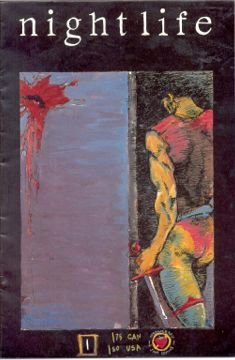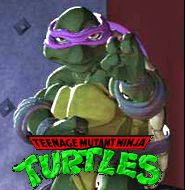Lost
Treasures :
The Black and White Bust of 1987
1987 was
one of the best years in the history of the comics medium.
Classic comics such as Watchmen, Dark Knight and Maus
were released to resounding acclaim both inside and outside
the comics industry. DC launched new versions of their oldest
characters as Crisis on Infinite Earths ended. New
publishers seemed to arrive every month with interesting new
titles. And the Teenage Mutant Ninja Turtles, born
as a parody of Frank Miller's mini-series Ronin, was
a smash hit that made its creators rich.
Unfortunately,
sometimes in great success lie the seeds of great destruction.
1987 was a year of great success, a boom year in the comics
market. As often happens, a terrible bust followed the boom.
By 1989
the dozens of publishers who appeared overnight to ride the
wave of success of the Turtles disappeared as quickly as they
had appeared. Some of the comics that disappeared with the
companies were wastes of trees, but lost at the same time
were some wonderful comics that deserve to be remembered.
In '87
there seemed to be new publishers every month. There was Harrier
Comics, who were British, and Amazing Comics, who did some
color books; Fandom House, who came from fanzine roots, and
A.C.E., who mainly reprinted Golden Age comics. There were
Aries Publications and Vortex; Arrow, Big Fun, Excalibur and
Mad Dog; Lubert, Strawberry Jam, Silverwolf, Planet X, Wonder,
Entertainment and the notorious Solson, a veritable flood
of b&w publishers that it impossible to keep up with.
How could
any fan tell the good from the bad? The simple answer is that
most readers couldn't. Anyone could tell that Fat Ninja
and G.I. Jackrabbits would be unreadable, but there
had to be some good comics, right? The happy news is that
there were many great comics published in that era, comics
that are now relatively easy to find very cheap. It's unfortunate.
Here are six comics of the era that are well worth hunting
for on eBay or at your next local convention.
Teenage
Mutant Ninja Turtles: Yes, the book that started the
boom/bust cycle has to be mentioned in any list. The earliest
dozen issues of TMNT, eight issues of TMNT itself
and individual "micro-series" of each Turtle, are
written and drawn by the original creative team of Kevin Eastman
and Peter Laird.
It's surprising
how much of an underground feel those issues contain. Before
becoming a million-dollar merchandising property, the Turtles
were rough around the edges. They drank and took glee at cutting
their opponents to shreds. TMNT was a funny comic aimed
for adults looking for a break from the ultra-serious comics
of Frank Miller, the hottest creator in the industry at the
time. Growing from parodying Ronin, it became a fun
lampoon of heroic hero comics. Issue 8 guest-stars Cerebus,
at that time the biggest character in b&w comics, in a
hilarious romp. TMNT wasn't a great comic, but it was
tremendous fun and is well worth seeking out.
 night
life: Perhaps the most obscure comic on this list
is also the one with the most surprises. night life
is the odd story of a neighborhood called The Kingdom in a
large North American city. In The Kingdom lived knights and
trolls, witches and warriors, and also coffee shops and subways. night
life: Perhaps the most obscure comic on this list
is also the one with the most surprises. night life
is the odd story of a neighborhood called The Kingdom in a
large North American city. In The Kingdom lived knights and
trolls, witches and warriors, and also coffee shops and subways.
It's a
neighborhood where one night you might stumble into your local
bar and happen to catch the Beatles playing; where the next
night you might see wolves ravage an evil man. Written by
Derek McCulloch and illustrated by Simon Tristam, this comic
is filled with lost potential. The characters were interesting
and three-dimensional, and the plots were intriguing.
Stig's
Inferno: When it comes to inspired fun and lunacy
this comic is one of the all time classics. The comic is basically
a shaggy dog story about a very strange guy named Stig who
gets killed by his very strange piano, and through a series
of misadventures ends up wandering through Hell. In the hands
of writer/artist Ty Templeton, who drew the hysterical Bigg
Time for DC/Vertigo in 2002, this comic is one of the
most inspired, lunatic rides in comics history. Fortunately,
you can read the first four issues (out of seven) of this
series online at this
site .
Deadface
and Bacchus: Two series for British publisher Harrier
Comics, written and illustrated by Eddie Campbell, the artist
behind From Hell. Anyone who's read any of Campbell's
mythology-based stories in either the old Dark Horse Presents
or Campbell's self-published Bacchus is familiar with
the artist's loose and charming style. However, readers may
be surprised by the serious and intense feel Campbell gives
these ten comics (eight of Deadface, two of the spinoff
Bacchus).
Produced
at a time when Campbell may have been feeling some youthful
angst, these comics tell a dramatic and exciting tale of war
amongst gods and immortals. These aren't light, historical
mythological romps; instead, people are killed and maimed
in these stories, where battles are real wars and innocents
are caught in the middle. Campbell would do some outstanding
Bacchus stories later on, but these stories have a primal
power and energy that is unique. And no matter how many times
you see him, the Eyeball Kid is a shocking character (pun
intended).
Retief:
Science fiction seldom sells in comics, nor do literary adaptations,
but this adaptation of Keith Laumer's hilarious science fiction
series was one of the classiest and most intelligent comics
of the 1980s. Released by Mad Dog Comics, writer Jan Strnad
and artist Dennis Fujitake captured all the fun and otherworldliness
of the original stories, making this an especially fresh and
charming series. Fujitake's art is especially spectacular
on this series. His clear line style and inventive images
make this comic a real treat.
One warning:
stay away from the issues published by Adventure Comics. Those
stories are not by the Strnad/Fujitake team and lack the spark
of their work.
 Reid
Fleming, World's Toughest Milkman: In the hands of
creator David Boswell, Reid Fleming was the meanest jerk of
a milkman who ever lived. He was also one of the most hilarious
comics characters of his era. Reid
Fleming, World's Toughest Milkman: In the hands of
creator David Boswell, Reid Fleming was the meanest jerk of
a milkman who ever lived. He was also one of the most hilarious
comics characters of his era.
Full of
unexpected twists and turns, Reid Fleming was an over-the-top
surrealistic masterpiece. Most back issues are still available
at the
official site.
It was
very hard to narrow this list down to only a half-dozen titles.
I had to skip Munoz & Sampayo's brilliant Sinner,
Ted McKeever's amazing Eddy Current and Transit,
the wonderful Night Streets, Scott Saavedra's hilarious
Dr. Radium (due for a revival from Slave Labor Graphics
later this year -- editor), Mike Bannon's hysterical To
Be Announced, Larry Marder's unique Tales of the Beanworld
and many more titles of the era.
Do yourself
a favor next time you're at your local comics shop and dig
deep into the quarter bins. You might find one of these lost
treasures.
|

 night
life: Perhaps the most obscure comic on this list
is also the one with the most surprises. night life
is the odd story of a neighborhood called The Kingdom in a
large North American city. In The Kingdom lived knights and
trolls, witches and warriors, and also coffee shops and subways.
night
life: Perhaps the most obscure comic on this list
is also the one with the most surprises. night life
is the odd story of a neighborhood called The Kingdom in a
large North American city. In The Kingdom lived knights and
trolls, witches and warriors, and also coffee shops and subways.
 Reid
Fleming, World's Toughest Milkman: In the hands of
creator David Boswell, Reid Fleming was the meanest jerk of
a milkman who ever lived. He was also one of the most hilarious
comics characters of his era.
Reid
Fleming, World's Toughest Milkman: In the hands of
creator David Boswell, Reid Fleming was the meanest jerk of
a milkman who ever lived. He was also one of the most hilarious
comics characters of his era. 




